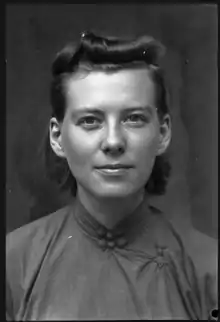Isabel Crook
Isabel Crook (Chinese: 饶素梅; pinyin: Ráo Sùméi; born 15 December 1915) is a Canadian anthropologist and former professor at Beijing Foreign Studies University. She is notable for her participation in the Cultural Revolution, as well as her work as a teacher and researcher.
Isabel Crook | |||||||
|---|---|---|---|---|---|---|---|
 | |||||||
| Born | December 15, 1915 Chengdu, Sichuan, China | ||||||
| Occupation | Professor, anthropologist | ||||||
| Language | English, Chinese | ||||||
| Nationality | Canada United Kingdom | ||||||
| Alma mater | University of Toronto London School of Economics | ||||||
| Notable works | Xinglong Chang: Field Notes of a Village Called Prosperity 1940-1942 Revolution in a Chinese Village: Ten Mile Inn | ||||||
| Notable awards | Medal of Friendship (2019) | ||||||
| Spouse | |||||||
| Children | 3 sons | ||||||
| Relatives | Homer G. Brown (father) Muriel J. Hockey (mother) | ||||||
| Chinese name | |||||||
| Traditional Chinese | 饒素梅 | ||||||
| Simplified Chinese | 饶素梅 | ||||||
| |||||||
Early life
Isabel Crook was born on December 15, 1915, in Chengdu, Sichuan, to Canadian missionaries Homer and Muriel Brown.[1] Homer Brown was the Dean of the Education Faculty at West China Union University, and Muriel set up Montessori Schools in China and served on the board of the YWCA.[2] When Crook was young, she became interested in anthropology and the many ethnic minorities in China. At the age of 23, Crook graduated from the University of Toronto and began carrying out field research in Li County, Aba Tibetan and Qiang Autonomous Prefecture, Sichuan Province.
Career, Marriage, and the Cultural Revolution
In early 1940s, she met David Crook, a committed Stalinist who had spied for the KGB in Spain and Shanghai, and married him in 1942.[1] In 1947, Isabel and David Crook went to Ten Mile Inn, Shidong Township, Hebei Province, to observe and study the revolutionary land reform.[3] Six months later they accepted an invitation from CPC leaders to teach at a newly established foreign affairs school, which was the forerunner of today's Beijing Foreign Studies University (BFSU).[1] As a teacher at BFSU Crook laid the foundation for foreign language education in China. During the Cultural Revolution, David Crook was imprisoned from 1967-1973 in Qincheng prison, while Isabel Crook was confined on the BFSU Campus.[4] Despite this, Isabel Crook has stated that she understood and forgave her captors.[1] In June 2019, she became an honorary citizen of Bishan District, Chongqing.[5]
Personal life
Isabel Crook was married to David Crook, a journalist and a member of the British Communist Party. They have three sons.
Works
- Xinglong Chang: Field Notes of a Village Called Prosperity 1940-1942 (兴隆场:抗战时期四川农民生活调查(1940-1942))
- Revolution in a Chinese Village: Ten Mile Inn (十里店:中国一个村庄的革命)
Awards
On September 30, 2019, Isabel Crook was awarded the Medal of Friendship by Chinese president Xi Jinping.[6]
References
- "A Story of Rural Wartime China, 70 Years in the Making". The Wallstreet Journal. 13 December 2013. Retrieved 5 October 2019.
- "Parents 1915, Chengdu – Isabel Crook". 2018-04-29. Archived from the original on 2018-04-29. Retrieved 2020-03-02.
- "Isabel Crook: Live with China one century". chinadaily. 7 July 2017. Retrieved 5 October 2019.
- "The Autobiography of david crook - The Ballad of Beijing Gaol (1967-73)". davidcrook.net. Retrieved 2020-03-02.
- Zeng Qinglong (曾清龙) (18 September 2019). 国家最高荣誉!璧山荣誉市民伊莎白·柯鲁克被授予“友谊勋章”. Sohu (in Chinese). Retrieved 5 October 2019.
- "Isabel Crook: A life-long friend of China". cri.cn. 26 September 2019. Retrieved 5 October 2019.